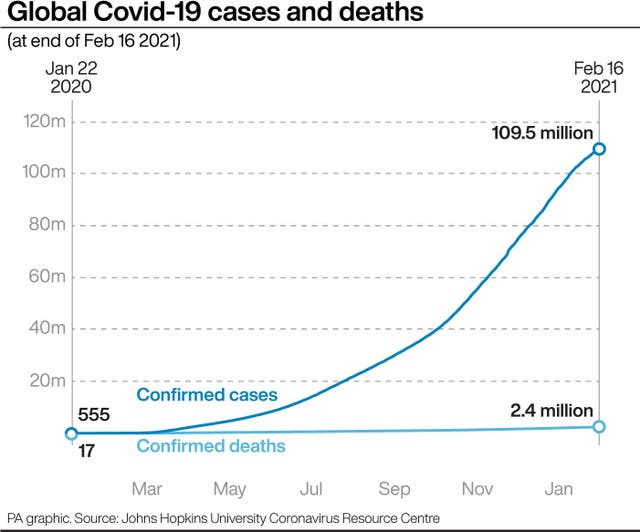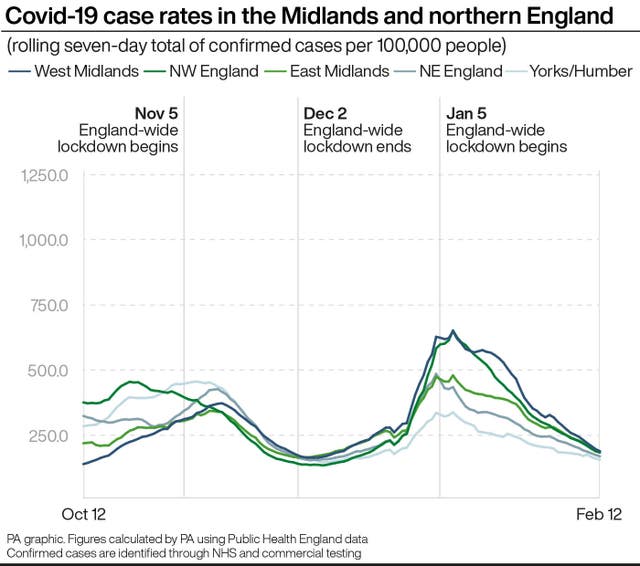World’s first study to deliberately expose people to Covid-19 to begin in UK
The research will help support the pandemic response by aiding vaccine and treatment development.

The world’s first study which will deliberately expose volunteers to coronavirus to establish the smallest amount of virus needed to cause infection will take place in the UK.
Starting in the next few weeks, the human challenge trial will involve up to 90 carefully selected, healthy adult volunteers being deliberately exposed to Covid-19 in a safe and controlled environment.
Participants will receive the virus as drops in the nose, and have to quarantine for more than two weeks at the Royal Free Hospital in London while they are monitored.
The first-of-its-kind study has been approved by the UK’s clinical trials ethics body.
It will give doctors a greater understanding of Covid-19 and help support the pandemic response by aiding vaccine and treatment development.
Because the safety of volunteers is paramount, this virus characterisation study will initially use the version of the virus that has been circulating in the UK since March 2020.
This variant has been shown to be of low risk in young healthy adults.
But the study could be adapted to new variants in the future.
Medics and scientists will closely monitor the effect of the virus on volunteers and will be on hand to look after them 24 hours a day.
The study is not designed to induce symptoms in volunteers and as soon as people start to shed virus from their nose, they will be given remdesivir as a pre-emptive treatment.
Peter Openshaw, professor of experimental medicine at Imperial College London, said: “It’s important to emphasise that the aim of the initial studies are not to produce any great severity of disease.
“Indeed, if we can just demonstrate that the virus grows in the nose, that’s really the endpoint we’re looking for.
“We’re not aiming to make any of the subjects sick and we’re doing that by very slowly escalating the dose.”
The researchers are working closely with the Royal Free Hospital and the North Central London (NCL) Adult Critical Care Network to ensure the study will not affect the NHS’s ability to care for patients during the pandemic.
The study will not begin without their go-ahead, the Department for Business, Energy and Industrial Strategy (Beis) has announced.
Interim chairman of the Vaccines Taskforce, Clive Dix, said: “We have secured a number of safe and effective vaccines for the UK, but it is essential that we continue to develop new vaccines and treatments for Covid-19.

“We expect these studies to offer unique insights into how the virus works and help us understand which promising vaccines offer the best chance of preventing the infection.”
After the initial study has taken place, vaccine candidates proven to be safe in clinical trials could be given to small numbers of volunteers who are then exposed to coronavirus.
This will help identify the most effective vaccines and accelerate their development.
People aged between 18 and 30 years old, who are at the lowest risk of complications resulting from coronavirus, are being encouraged to volunteer.
Volunteers will receive around £4,500 to participate in the study which will involve some 17 days of quarantine and follow-ups over 12 months.
Business Secretary Kwasi Kwarteng said: “Researchers and scientists around the world have made incredible progress in understanding Covid-19 and developing critical vaccines to protect people.

“While there has been very positive progress in vaccine development, we want to find the best and most effective vaccines for use over the longer term.
“These human challenge studies will take place here in the UK and will help accelerate scientists’ knowledge of how coronavirus affects people and could eventually further the rapid development of vaccines.”
In the past, human challenge studies have played important roles in accelerating the development of treatments for diseases including malaria, typhoid, cholera, norovirus and flu.
The trials have also helped researchers establish which possible vaccine is most likely to succeed in phase three clinical trials that would follow, usually involving thousands of volunteers.
This study, backed by a £33.6 million UK Government investment, will also help doctors understand how the immune system reacts to coronavirus and identify factors that influence how the virus is transmitted.

This includes how a person who is infected with Covid-19 virus transmits infectious virus particles into the environment.
The human challenge study is being delivered by a partnership between the Government’s Vaccines Taskforce, Imperial College London, the Royal Free London NHS Foundation Trust and the industry-leading clinical company hVIVO, which has pioneered viral human challenge models.
The Royal Free Hospital’s specialist and secure clinical research facilities in London are specifically designed to contain the virus.
Highly trained medics and scientists will be on hand to carefully examine how the virus behaves in the body and to ensure the safety of volunteers.
The virus being used in the characterisation study has been produced by a team at Great Ormond Street Hospital for Children NHS Foundation Trust in London, in collaboration with hVIVO with support from virologists at Imperial College London.
The Health Research Authority (HRA) and the Medicines and Healthcare products Regulatory Agency (MHRA) are the UK’s regulators responsible for providing ethics and regulatory approval, respectively for all human clinical trials.
Research Ethics Committees (RECs) are formed by the HRA as part of the approval process.
A specially-appointed independent REC has approved the study, and after reviewing the protocol, the MHRA concluded the virus characterisation study did not require its approval because the study does not involve an investigational medicinal product.
– People can express an interest in taking part in this research at ukcovidchallenge.com





